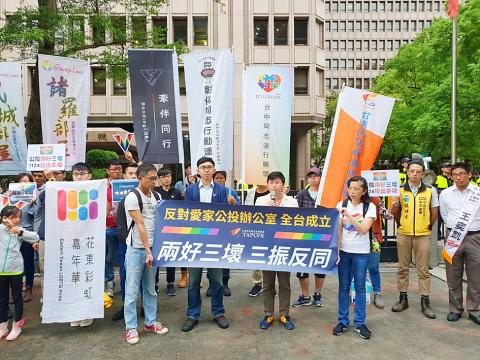Two pro-marriage equality referendums are likely to be held alongside the local elections next month, after the Central Election Commission yesterday announced that they have passed the second-phase legal threshold.
The commission on Tuesday is to decide whether the proposals will be on the ballot for the nine-in-one elections on Nov. 24.
The proposals, initiated by Social Democratic Party member Miao Po-ya (苗博雅) and advocate Wang Ting-yu (王鼎棫) respectively, have gathered enough signatures to clear the 281,745 threshold for the second phase of the process, the commission said.

Photo: Li Hsin-fang, Taipei Times
The proposals directly oppose three referendums organized by conservative groups and Chinese Nationalist Party (KMT) lawmakers that have already cleared the commission’s review process.
Miao’s referendum proposal to legalize same-sex marriage under the marriage chapter of the Civil Code garnered 432,329 valid and 42,448 invalid signatures, 2,498 of which were forgeries and 44 belonged to dead people, it said.
Wang’s proposal supporting lessons on emotional and sex education and homosexuality through the Gender Equity Education Act (性別平等教育法) garnered 438,066 valid and 46,183 invalid signatures, including 2,580 suspected forgeries and 42 belonging to the deceased, the commission said.
The commission is likely to clear the proposals for the ballot box while pressing forgery charges against their organizers, as it has done for three KMT-initiated referendums.
Later yesterday, the Taiwan Alliance to Promote Civil Partnership Rights (TAPCPR) and other groups held a news conference ouside the commission in Taipei to express their “resolute opposition” to the anti-LGBT referendums initiated by the Happiness of the Next Generation Alliance and other groups.
The Happiness of the Next Generation Alliance is associated with the referendums to legally define marriage as a union between a man and a woman, recognize same-sex relationships by means other than marriage and to forbid mentioning homosexuality in gender-equality classes at elementary and junior-high schools.
The commission never should have allowed the three proposals, which are potentially unconstitutional, to become referendums, TAPCPR executive officer and LGBT rights attorney Victoria Hsu (許秀雯) said.
The TAPCPR said it has applied with the commission to establish offices to campaign against the anti-LGBT referendums, as referendum opponents are entitled to participate in the commission’s televised public forums and debates under Article 20 of the Referendum Act (公民投票法).
“The TAPCPR is prepared to expose anti-LGBT organizations that espouse family values to mask their true agenda of discrimination and hate,” the organization said. “While anti-LGBT groups have better funding to buy ads, we will use public debate as our platform to spread factual information.”

A magnitude 5.6 earthquake struck off the coast of Yilan County at 12:37pm today, with clear shaking felt across much of northern Taiwan. There were no immediate reports of damage. The epicenter of the quake was 16.9km east-southeast of Yilan County Hall offshore at a depth of 66.8km, Central Weather Administration (CWA) data showed. The maximum intensity registered at a 4 in Yilan County’s Nanao Township (南澳) on Taiwan’s seven-tier scale. Other parts of Yilan, as well as certain areas of Hualien County, Taipei, New Taipei City, Taoyuan, Hsinchu County, Taichung and Miaoli County, recorded intensities of 3. Residents of Yilan County and Taipei received

Taiwan has secured another breakthrough in fruit exports, with jujubes, dragon fruit and lychees approved for shipment to the EU, the Ministry of Agriculture said yesterday. The Animal and Plant Health Inspection Agency on Thursday received formal notification of the approval from the EU, the ministry said, adding that the decision was expected to expand Taiwanese fruit producers’ access to high-end European markets. Taiwan exported 126 tonnes of lychees last year, valued at US$1.48 million, with Japan accounting for 102 tonnes. Other export destinations included New Zealand, Hong Kong, the US and Australia, ministry data showed. Jujube exports totaled 103 tonnes, valued at

BIG SPENDERS: Foreign investors bought the most Taiwan equities since 2005, signaling confidence that an AI boom would continue to benefit chipmakers Taiwan Semiconductor Manufacturing Co’s (TSMC, 台積電) market capitalization swelled to US$2 trillion for the first time following a 4.25 percent rally in its American depositary receipts (ADR) overnight, putting the world’s biggest contract chipmaker sixth on the list of the world’s biggest companies by market capitalization, just behind Amazon.com Inc. The site CompaniesMarketcap.com ranked TSMC ahead of Saudi Aramco and Meta Platforms Inc. The Taiwanese company’s ADRs on Tuesday surged to US$385.75 on the New York Stock Exchange, as strong demand for artificial intelligence (AI) applications led to chip supply constraints and boost revenue growth to record-breaking levels. Each TSMC ADR represents

TRUST: The KMT said it respected the US’ timing and considerations, and hoped it would continue to honor its commitments to helping Taiwan bolster its defenses and deterrence US President Donald Trump is delaying a multibillion-dollar arms sale to Taiwan to ensure his visit to Beijing is successful, a New York Times report said. The weapons sales package has stalled in the US Department of State, the report said, citing US officials it did not identify. The White House has told agencies not to push forward ahead of Trump’s meeting with Chinese President Xi Jinping (習近平), it said. The two last month held a phone call to discuss trade and geopolitical flashpoints ahead of the summit. Xi raised the Taiwan issue and urged the US to handle arms sales to